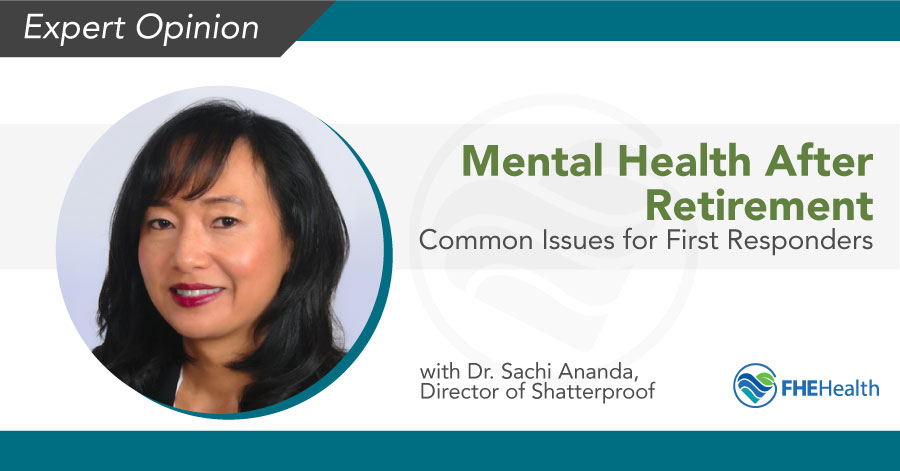
This article has been reviewed for accuracy by our peer review team which includes clinicians and medical professionals. Learn more about our peer review process.
Updated 10/30/24
Retirement can be a challenging transition for many people, especially for those who draw a great deal of purpose and identity from their work. First responders often fall into this category. Most of them choose careers as police officers, firefighters or EMS professionals, because they want to help people and serve their communities. Much of their identity derives from this strong sense of public service and the need to be readily available to those in crisis.
This issue of identity is one of a number of issues in retirement that uniquely affect first responders and can impact their mental and physical wellbeing. Just ask Dr. Sachi Ananda, Ph.D., LMHC, MCAP, who is the director of FHE Health’s specialized program for first responders, “Shatterproof FHE Health.” She says first responders often show up in mental health treatment after they retire because of various issues they may be experiencing related to the transition. In a recent interview, she laid out the various ways that retirement can introduce new mental health issues, have a mental health impact and in some cases reveal a need to seek professional treatment.
What Are Common Mental Health Issues that First Responders Face in Retirement?
Identity issues, as mentioned, can be common among retired first responders. That is because “they signed up for a career that’s more than a job—it’s a personal and professional identity of serving and protecting others—and when they retire, they are no longer officially a first responder,” Dr. Ananda said.
Related to this question of identity is the fact that “being a first responder comes with some status and privileges and is a position of authority and respect … and when they leave that field, they may not automatically get all of those benefits and that same recognition.” And “if they’re no longer in uniform, they don’t have those symbols of power and authority.”
In this sense, retirement can cause a first responder to question their sense of identity. They may feel like they have lost a key signifier of who they are, and the experience may adversely impact a first responder’s mental health.
Boredom can also be common and a potential trigger of mental health issues during retirement, according to Dr. Ananda. She noted that first responders typically “come from a highly structured environment, a lot of protocols, policies, and shift work and they’re following certain guidelines according to their field and a chain of command … when you leave that structured environment for no structure, it becomes difficult to know what to do with oneself.”
Isolation can be another feature of retirement. Here is how Dr. Ananda explained it:
“With first responders in general, there’s the feeling that people don’t understand them because they face a lot of crises. When they lose that connection with their peer group (other first responders), that adds to their isolation—so now they are left only with their families and friends, and that can make them feel more alienated and alone.”






